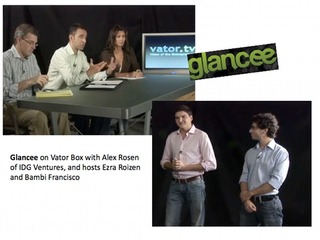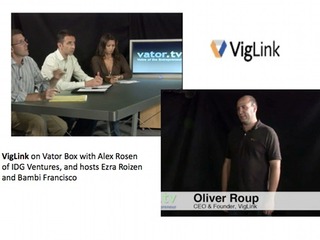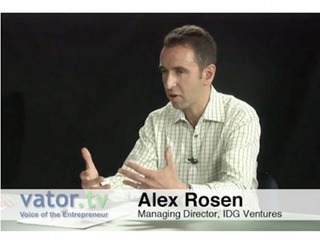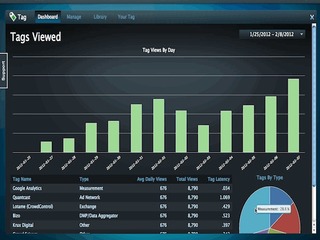
Meet Alex Rosen, Managing Director at IDG Ventures
Rosen has been an active investor and advisor to early-stage tech companies for over two decades
Editor's Note: Our annual Vator Splash Spring 2016 conference is this Thursday, May 12, 2016 at the historic Scottish Rite Center in Oakland. Speakers include Nigel Eccles (CEO & Co-founder, FanDuel), Andy Dunn (Founder & CEO, Bonobos), Mitch Kapor (Founder, Kapor Center for Social Impact); Founders of NextDoor, Handy, TubeMogul; Investors from Khosla Ventures, Javelin Venture Partners, Kapor Capital, Greylock, DFJ, IDG, IVP and more. Join us! REGISTER HERE.
There has been a big debate over the last few years over whether the Series A crunch is real or not. What everyone can agree on, though, is that there are definitely more seed and early stage funds now than ever before, and more people willing to give money to young companies looking to make it big.
 In this edition of "Meet the VC," we interview Alex Rosen of IDG Ventures, which has been around since 1996, to learn more about his firm and his views on the tranforming VC landscape. (Additionally, Rosen will be joining us for a special session on the ongoing market slide this Thursday at Vator Splash Spring. Get your tickets here.)
In this edition of "Meet the VC," we interview Alex Rosen of IDG Ventures, which has been around since 1996, to learn more about his firm and his views on the tranforming VC landscape. (Additionally, Rosen will be joining us for a special session on the ongoing market slide this Thursday at Vator Splash Spring. Get your tickets here.)
Alexander (Alex) Rosen is a Managing Director with IDG Ventures. He has been working with early stage technology companies as an active investor and advisor for over 20 years. Today, he focuses on investments in cloud infrastructure, SaaS applications, ad tech, and consumer marketplaces.
In particular, he’s passionate about companies at the intersection of consumer and enterprise technologies. He currently serves as board director at MindMeld (conversational natural-language interfaces), Krux (data management platform SaaS), Minted (design-driven e-commerce marketplace), Smartling (translation management SaaS), Tempered Networks (security for industrial IoT), Uplift (payment management and marketing for online merchants), and Vouch (reputation-based lending). He also led IDG Ventures’ in a number of companies including Appboy, Chubbies, Datanyze, Fastly, Indiegogo, Prism Skylabs, The League, and We Heart It. Previously, he was a General Partner at Sprout Group, where he was head of the Internet and Software group.
Alex has been a board member, observer, or investor at Flowdock (acquired by Rally), MyNewPlace (acquired by RealPage), mySimon (acquired by CNET), Quintus (IPO, acquired by Avaya), Fogdog (IPO, acquired by GSI Commerce), Sapient Health Network (acquired by WebMD), SideStep (acquired by Kayak), Rhythms (IPO, acquired by AT&T), and Vidible (acquired by AOL). Alex started his venture capital career as an associate with General Atlantic Partners, served as an advisor to Vector Capital, and developed software for Telcordia and AT&T Bell Labs early in his professional life. He holds BS degrees in electrical engineering and economics from MIT and an MBA from Stanford University.
VatorNews: Tell me a bit about your background. Where did you go to school? What led you to the venture capital world? Alex Rosen: I was born in Russia and came to the U.S. in 1981, right before high school. My freshman year in high school I came face to face with a personal computer, the Commodore PET. Most people remember the Commodore 64 from those days, a popular early home PC, but my high school had the Commodore PET and I thought it was the coolest thing ever. So I learned how to program in BASIC, started my high school computer club, and decided I wanted to build computers.
Alex Rosen: I was born in Russia and came to the U.S. in 1981, right before high school. My freshman year in high school I came face to face with a personal computer, the Commodore PET. Most people remember the Commodore 64 from those days, a popular early home PC, but my high school had the Commodore PET and I thought it was the coolest thing ever. So I learned how to program in BASIC, started my high school computer club, and decided I wanted to build computers.
I went to MIT, majored in electrical engineering, and paid for a good chunk of college by writing code through the summers and during school. What I realized was that building computers was actually not well-suited to me because I didn’t have the attention span needed for really long projects. And, frankly, I was surrounded by much smarter guys.
I got a second Bachelor’s in Economics, spent a couple years at an investment bank right after college trying to learn something about business, and realized that was too far towards finance for me. As I was exploring what I wanted to do next, I got an entry-level job at a venture firm in New York called General Atlantic Partners through one of my undergrad acquaintances. I thought it was something I’d try to do for a year before business school, and I’ve been doing it for over 20 years.
VN: What is your investment philosophy or methodology?
AR: First and foremost, I’m driven by the founder. There’s almost a religious debate in venture whether you bet on the market or the management, and I bet on the management because I believe that a great founding team will find a good market to go after. So I look for founders who are passionate about their business, who are willing to do unreasonable things in order to be successful, who have some background in the field they’re attacking, and who are people who I would enjoy working with.
VN: What do you like to invest in? What are your categories of interest?
AR: The sweet spot for me is what used to be called “Series A.” Nomenclature aside—first venture money into a company. Sometimes it’s Series A, sometimes it’s seed, sometimes it’s Series B; but it’s still relatively early in the company’s formation.
I tend to invest primarily in software-driven businesses, although I’ve done a lot of consumer investing. In general, what I’m interested in are a set of technology and services that create a better experience for the consumer. So I invest in infrastructure and applications software, but it’s often tied to the end user experience by making the applications that run on top of infrastructure faster, more reliable, more user-friendly, translated into natural languages, driven by voice, etc.
VN: What would you say are the top investments you have been a part of? What stood out about those investments in particular?
AR: It’s a little bit like asking “which if your children do you like more?” I only have two kids and I have a lot more portfolio companies!
But I’ll mention a couple.

About 4.5 years ago, I co-led the Series A in a company called Krux, a data management platform for large consumer marketers and publishers. We invested in a company that had one customer, so they had a little bit of revenue. The company has built out a product portfolio and a really dominant position in this area that became known as DMP, or data management platform. It wasn’t yet a thing when we invested, which is to my point that great founders will find a great market.
The founder Tom Chavez has an amazing personal story. He grew up in a blue-collar family, neither one of his parents went to college but worked very hard. Very modest background, but then Tom goes to Harvard undergrad, gets a Ph.D. from Stanford, starts a company that goes through the first bubble, survives it, builds a real business and sells it to Microsoft, takes a couple years and starts the next company. Just a really impressive, super smart, super driven founder who brought a lot of his former team with him.
In the most recent market evaluation by Forrester, they’re viewed as the market leader above Oracle, Adobe, and a couple other big guys. They have tens of million in revenue, a couple hundred customers, and a well-recognized brand. So it’s a big, interesting software company growing over 100 percent year-over-year. It’s been interesting, gratifying, challenging, and quite rewarding process.
I’ll also mention Vidible, which was software for video content publishers to syndicate their content out to websites. We invested in the seed round with a small venture firm, ended up co-leading the Series A, and they grew revenue quite quickly. We helped them get IDG as a customer. Within a year after the Series A, Vidible got acquired by AOL for a really nice return for us and a great personal outcome for the founders.
Lastly, I’m fortunate to be the only Series A investor in Minted, now a large marketplace for designers, which is run by an awesome founder, Mariam Naficy.

VN: What kind of traction do you look for in your startups? And can you be specific? Are you looking for a number of customers or order volume?
AR: The sweet spot is we’d like to see a few customers using the product. For an enterprise company, it would be a single-digit number of customers—call it 5-10. Not necessarily paying large amounts but enough that we can get a sense of practical applications for the product.
Krux had one paying customer and a few others in discussion. Minted had just launched its website. See you get the idea.
VN: Given that these days a Seed round is yesterday's Series A, meaning today a company raises a $3M Seed and no one blinks. But 10 years ago, $3M was a Series A. So what are the attributes of a seed round vs a Series A round?
AR: It’s getting harder to distinguish them. The expansion of the seed round and emergence of the micro VCs or super angels has been the biggest change in venture landscape in the last 10 years. I think it’s a great change because it gives founders more options for funding.
Realistically, the lines do blur but you can draw some lines. A seed round today will still be smaller most of the time than a Series A round of 15-20 years ago. A Series A round used to be something like $5 million. A seed round today is usually a little bit smaller, between $1-3 million though we’ve seen some as high as $4 million, but they’re still a bit smaller than a Series A round of the past. The reason it’s attracted founders is because the valuations for these seed rounds are closer to what the Series A valuations were in the past, but they can launch the product cheaper, with less dilution.
VN: Given all the money moving into the private sector, I believe there's more money going into late-stage deals in 2015 than there was during the heyday, back in 2000, do you think we're in a bubble? And is it deflating now?
AR: My perspective goes back to the mid-nineties. It’s safe to say there was a bubble in late-stage private company valuations through late last year. All you have to do is look at any of the graphs from PitchBook showing the average valuation or dollars per round for Series C and later and you’ll see a huge run-up in valuation.

We don’t live in that world very much. We like to invest in businesses that don’t require a lot of capital because that creates more options for founders as well as investors. For early-stage investing, I’m not seeing valuation change very much yet.
If you look at Q1 data, it will actually show that Series E valuations have not gone down but there are fewer of them. So the quality of deals getting done are higher because OK ideas (vs great ideas with traction) are having a harder time getting funding right now.
VN: If the bubble is deflating, how does that affect your investing?
AR: We’ve always had an explicit part of our investment thesis that we’re not going to rely on friendly capital markets to pump in hundreds of millions of dollars in our companies. We look at those businesses that can get to profitability on modest amounts of capital. So it’s not affecting what we invest in or how frequently we’re investing.
VN: What do you like best about being a VC?
AR: There’s the joy of working with really smart, driven people who are starting these great companies. Whether I’m investing in them or not, I have the privilege of talking to the smartest people in technology as my job, so it’s hard not to like that. I love the fact that the companies we look at are defining the future, so it’s a little bit about seeing what tomorrow’s going to look like. Sometimes we’re wrong, but at least it gives you a view on it. I would say that venture is a combination of understanding technology, working with people, and understanding the game of business. It’s that triangle that I find exciting.
VN: What is the size of your current fund?
AR: Our current fund is $120 million. Our prior fund was $100 million, and the one before was $100 million.
We’re a little bit of a unique animal in the venture ecosystem: IDG, which is a privately held tech media company is a limited partner in our fund, but they contribute less than half of our overall capital and they’re not involved in any investment or operating decisions. We’re set up purely as an independent firm that is owned by the partners.
We use the name IDG because they’re a big investor in our fund, and they also provide a bunch of free marketing services that are useful for our portfolio companies. What IDG is able to do through its events, conferences, market research, and online publishing is reach about 240 million buyers of technology around the world, and we enable our portfolio companies in a variety of ways to get those customers. VN: What is the investment range? How much do you put into each startup?
VN: What is the investment range? How much do you put into each startup?
AR: We invest $2-5 million in Series A or Series B, and we’ll do $200-500K in a seed round.
VN: Is there a typical percent that you want of a round? For instance, do you need to get 20% or 30% of a round?
AR: We don’t care if we’re leading, co-leading, only investor, or syndicate. And we’re flexible on ownership.
VN: Where is the firm currently in the investing cycle of its current fund?
AR: We’re about half invested.
VN: What percentage of your fund is set aside for follow-on capital?
AR: We do it bottoms-up. So every quarter we look at every one of our companies and their financing needs and re-evaluate how much we need and how much we don’t.
VN: What series do you typically invest in? Are they typically Seed or Post Seed or Series A?
AR: Our sweet spot is Series A. We’ll do seeds and we’ll do Series B.
VN: In a typical year how many startups do you invest in?
AR: We’ll do 4-6 Series A investments and another 4-6 seed investments. In total, around 10 investments per year.
Related Companies, Investors, and Entrepreneurs
IDG Ventures
Angel group/VC
Joined Vator on
IDG Ventures is a global network of venture capital funds with approximately $3.6 billion under management and a portfolio of over 220 companies built over the last 15 years. The IDG Ventures network is comprised of five independent partnerships managing funds in North America and Asia. Each partnership makes investments on behalf of its limited partners, including International Data Group (IDG), the world's largest IT media company. By combining the IDG platform – an unparalleled combination of global publishing, market research (IDC), and conferences and exhibition resources – with years of hands-on experience in early-stage company building, each IDG Ventures fund helps companies understand their markets better and penetrate them faster than their competition
Krux Digital
Startup/Business
Joined Vator on
Founded in 2010, Krux delivers data fabric for the consumer web. The company's platform helps websites capture, control, and connect data across screens and sources. With Krux, companies deliver cooler, safer, faster, smarter web experiences. With Krux, consumers gain confidence that their favorite websites are operating under the plain light of day. Dozens of clients and partners in the US, Europe, and Asia have adopted Krux technology, including companies like NBC Universal, Sanoma, Recruit, Financial Times, and The Wall Street Journal Digital Network. Find out more at www.krux.com.

Alexander Rosen
Joined Vator on
Two decades of investing in, and working with, software and consumer companies.Related News


AOL goes deeper into video with Vidible acquisition

IDG Ventures on Vator Box checks out VigLink

How to get funded by IDG's Alex Rosen

Krux zeros in on giving publishers power on their sites

